ISO Speed Settings for Still Photos
- ISO Speed Range When Set Manually
- ISO Speed Range Used with ISO Auto
- Minimum Shutter Speed for ISO Auto
Set the ISO speed (image sensor's sensitivity to light) to suit the ambient light level.
For details on ISO speed in movie recording, see ISO Speed in Movie Recording.
-
Set the ISO speed.
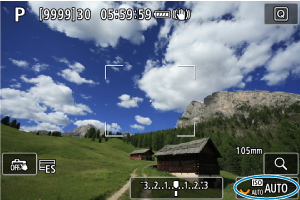
- With an image displayed on the screen, set by turning the
dial.
- ISO speed can be set within ISO 100–102400 in 1/3-stop increments.
- Select [AUTO] to set the ISO speed automatically.
- For details on the ISO Auto range, see ISO speed (recommended exposure index) in still photo shooting.
- With an image displayed on the screen, set by turning the
ISO speed guide
- Low ISO speeds reduce image noise but may increase the risk of camera/subject shake or reduce the area in focus (shallower depth of field), in some shooting conditions.
- High ISO speeds enable low-light shooting, a larger area in focus (deeper depth of field), and longer flash range but may increase image noise.
Note
- ISO speed can also be set in the ISO speed item by pressing the
button with an image displayed on the screen.
- Can also be set on the [ISO speed] screen in [
:
ISO speed settings].
- To expand the manual ISO speed setting range from L (equivalent to ISO 50) to H (equivalent to ISO 204800), adjust [ISO speed range] in [
:
ISO speed settings] ().
Caution
- Image noise (dots of light or banding) and irregular colors may increase and apparent resolution may decrease at H (equivalent to ISO 204800), because this is an expanded ISO speed.
- Because L (equivalent to ISO 50) is an expanded ISO speed setting, the dynamic range will be somewhat narrower compared to the standard setting.
- Setting [
: Highlight tone priority] to [Enable] or [Enhanced] () will prevent you from selecting L (equivalent to ISO 50), ISO 100/125/160, or H (equivalent to ISO 204800).
- When shooting with a high ISO speed, high temperature, long exposure, or multiple exposure, image noise (graininess, dots of light, banding, etc.), irregular colors, or color shift may become noticeable.
- When shooting in conditions that produce an extreme amount of noise, such as a combination of high ISO speed, high temperature, and long exposure, images may not be recorded properly.
- If you use a high ISO speed and flash to shoot a close subject, overexposure may result.
ISO Speed Range When Set Manually
You can set the manual ISO speed setting range (minimum and maximum limits). You can set the minimum limit within L (equivalent to ISO 50) to ISO 102400, and the maximum limit within ISO 100 to H (equivalent to ISO 204800).
-
Select [
:
ISO speed settings].
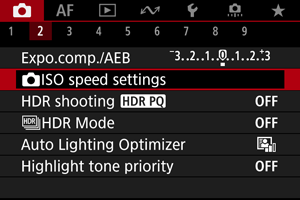
-
Select [ISO speed range].
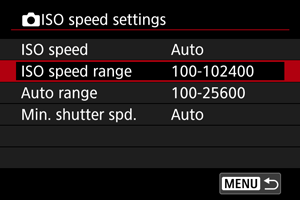
-
Set [Minimum].
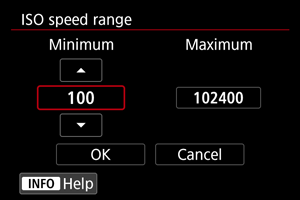
- Select the [Minimum] box, then press
.
- Select the ISO speed, then press
.
- Select the [Minimum] box, then press
-
Set [Maximum].
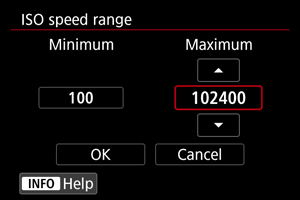
- Select the [Maximum] box, then press
.
- Select the ISO speed, then press
.
- Select the [Maximum] box, then press
-
Select [OK].
ISO Speed Range Used with ISO Auto
You can set the automatic ISO speed range for ISO Auto within ISO 100–51200. The minimum can be set within ISO 100–51200 and the maximum within ISO 200–51200, in 1-stop increments.
-
Select [Auto range].
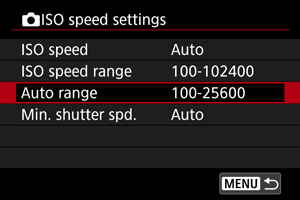
-
Set [Minimum].
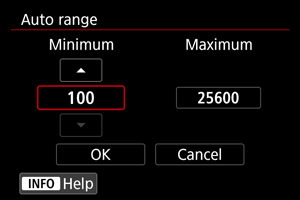
- Select the [Minimum] box, then press
.
- Select the ISO speed, then press
.
- Select the [Minimum] box, then press
-
Set [Maximum].
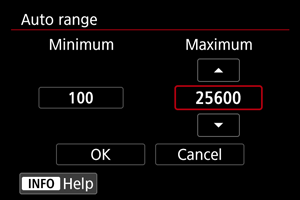
- Select the [Maximum] box, then press
.
- Select the ISO speed, then press
.
- Select the [Maximum] box, then press
-
Select [OK].
Minimum Shutter Speed for ISO Auto
To prevent shutter speeds from being set too low automatically, you can set the minimum shutter speed for ISO Auto.
This is effective in [] or [
] mode when shooting subjects in motion with a wide-angle lens, or when using a telephoto lens. It can also reduce camera shake and blurred subjects.
-
Select [Min. shutter spd.].
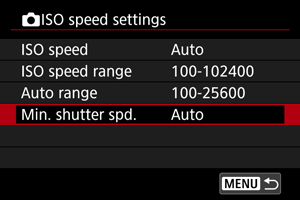
-
Set the desired minimum shutter speed.
Auto
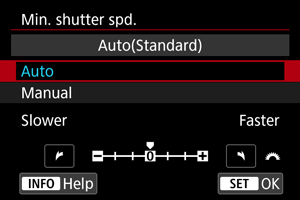
- If you select [Auto], turn the
dial to set the difference relative to standard speed (toward Slower or Faster), then press
.
Manual
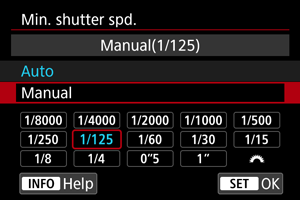
- If you select [Manual], turn the
dial to select the shutter speed, then press
.
- If you select [Auto], turn the
Caution
- If a correct exposure cannot be obtained with the maximum ISO speed limit set with [Auto range], a shutter speed slower than the [Min. shutter spd.] will be set to obtain the standard exposure.
- This function will not be applied to flash photography.
Note
- When [Auto(Standard)] is set, the minimum shutter speed will be the reciprocal of the lens focal length. A single step from [Slower] to [Faster] is equivalent to a single stop of the shutter speed.